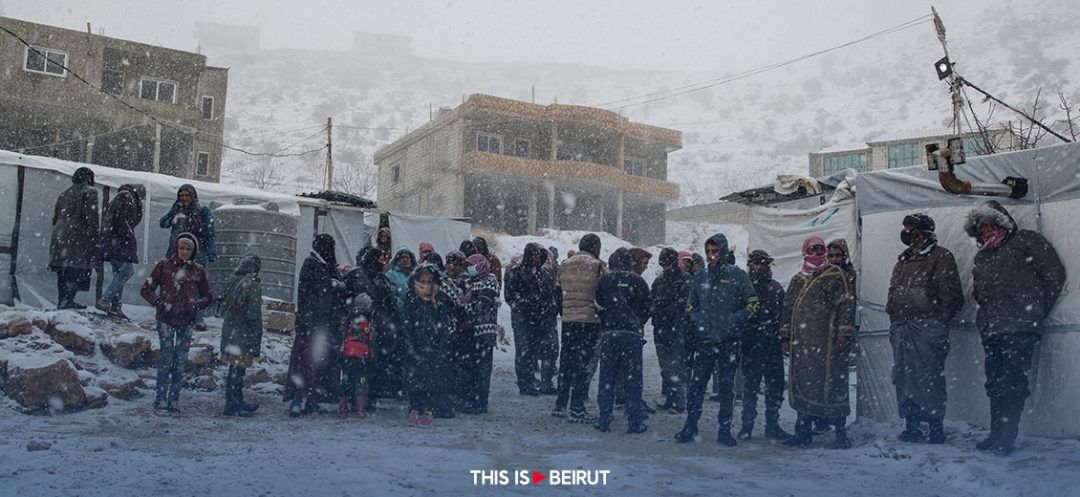
The Syrian issue is one of those recurring topics filled with bold statements, speeches at international podiums and "repatriation plans" on paper. However, the actual implementation of measures by various security services, municipalities or ministers tends to unravel along the way.
All of the above unfolds against a backdrop of societal conflict between two populations, often justified by the deplorable actions of some Syrians that are occasionally blown out of proportion. This conflict has the potential to escalate, especially if it assumes sectarian dimensions, a scenario frequently witnessed in Lebanon.
The reason for revisiting this well-worn topic stems from a recent study conducted by economist Charbel Nahhas. In its most pessimistic scenario, the study predicts that by 2038, the Lebanese population may only make up 52% of the overall local population. The analysis factors in varying birth rates, population movements including Lebanese emigration and Syrians relocating to Lebanon, and also the presence of Palestinians, Iraqis and other Asians and Africans.
Upon the revelation of this figure, though it is imprecise, one might feel a gust of panic sweeping through our mountains on a stormy night. To mitigate this horror B-movie scenario, we will offer some insights. But first, let’s acknowledge our shortcomings:
For years, we allowed refugees to flood in without control, not knowing the how, the how much, the why and the where from. In other words, it was a laissez-faire attitude coupled with utter statistical ignorance. Ironically, hundreds of civil servants (up to 800) were recruited for this task. However, their census of refugees and their specifics stopped at the 80,000 mark, citing exhaustion as the main reason for discontinuing the census.
But the mood was somewhat pleasant at the Ministry of Social Affairs, until a new killjoy minister tearfully dismissed everyone, thanking them for their achievements. Ever since, we solely depend on the surveys of international organizations, begging them to hand in their lists to avoid looking more ignorant than we already are.
That being said, let's explore pragmatic steps that can be taken to reduce this demographic burden. Maybe, for a change, we will succeed in solving it once and for all.
1. Instead of a haphazard type of repatriation, priority should be given to the countless detainees who can no longer be sustainably kept in Lebanon in terms of food or healthcare, especially those who pose a threat to society. Then, we ought to focus on workers in "non-approved sectors." In this regard, it is worth clarifying that Syrian workers have always been part of the workforce in Lebanon, especially in agriculture, construction and sanitation services. In fact, agreements were reached years ago with UN agencies specifically for these fields. Additional occupations can be considered on a case-by-case basis, based on the requirements of our economy.
2. For sectors beyond those specified, a viable solution would be to impose fines on employers who are tempted to recruit Syrian workers to cut on wages. Implementing a comprehensive work and residence permit system could effectively manage the influx.
3. A third approach would be to deny banking access to unwelcome individuals. Once their UN card—which allows them to withdraw around 150 dollars per month—is stripped away, many will no longer have an incentive to remain in Lebanon.
Certainly, on this issue, as on many more, there's a potential conflict with donor organizations. In theory, we could assert "national sovereignty" over our territory, even going as far as dismissing their representatives, as once hinted by Gebran Bassil. However, we must admit that we depend on their donations to alleviate our own difficulties. Every ministry or department relies on this foreign aid to get by. Adopting a confrontational stance would only make us look like a bunch of beggars denigrating another bunch of beggars.
4. In this regard, we made yet another mistake of keeping the most destitute displaced while pushing Syrian businessmen away. Consequently, the latter set up their businesses in Iraq, Turkey or elsewhere. Correcting this mistake could significantly contribute to our GDP.
5. A prompt and drastic solution must be found for refugees' free consumption of water, electricity and other services. It is quite baffling how this financial drain has been allowed to persist for such an extended period of time.
To those who question the effectiveness of these initial (and not all-inclusive) measures and uphold the need for impractical "radical solutions," two arguments are needed to better contextualize the issue:
• According to the latest census, the number of Palestinian refugees in camps in Lebanon is decreasing and nearing 200,000. Additionally, there are some Palestinians who have settled in apartments, integrating into the urban landscape.
It is important to clarify that this population, unlike the Syrians, has no country to go back to. The decline in the size of their community is attributed to many of them seeking better opportunities abroad, as they don't foresee a promising future in a country unlikely to grant them full rights. This highlights the fact that the everlasting presence of Syrians in Lebanon is not an unavoidable outcome.
• Another insightful perspective can be observed in the United Arab Emirates, where 90% of residents are foreigners, and yet the country is booming. In this specific case, these well-regulated and directed expatriates have significantly contributed to the nation's economic success. Incorporating some of their strategies in Lebanon could be beneficial.
Finally, we really need to stop blaming the Syrians for all our miseries. None of the international reports addressing our financial crisis identifies the Syrians as the root cause of our downfall. At most, they are seen as an aggravating factor.
However, we are unlucky to live in a country where accountability lies in the hands of irresponsible people, whose sole task is to perpetuate herds of scapegoats.
nicolas.sbeih@icibeyrouth.com
Read more




Comments